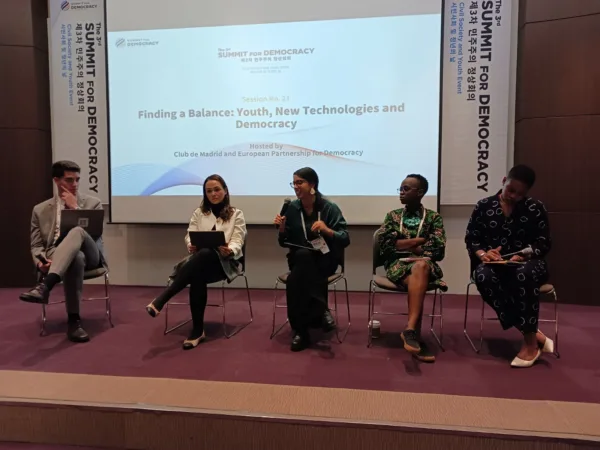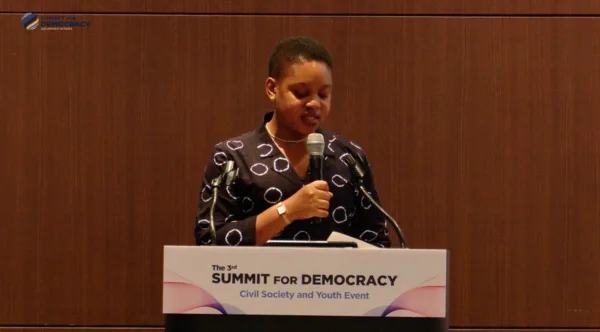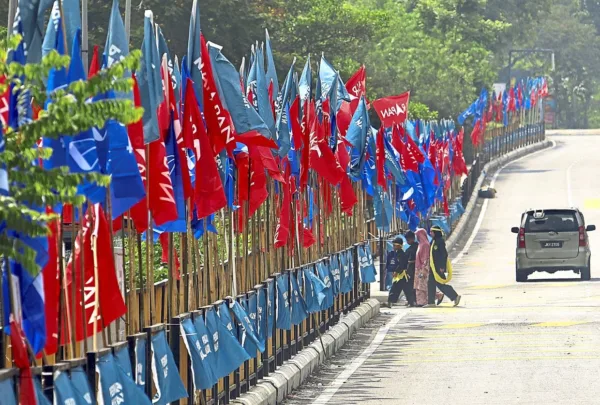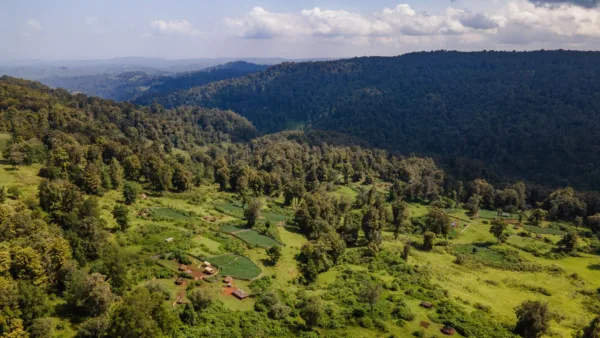A comment online can kill you. A simple comment online can lead to someone’s death and even civil war. It may sound unbelievable, but history bears witness to such events: ongoing lawsuits against Meta for contributing to deaths fueled by ethnic violence in Ethiopia, or the inciting violence in South Sudan in 2012. As social media continues to gradually integrate more into our lives, the distinction between life and virtual reality becomes increasingly blurred. In response to these issues, this year’s Third Summit for Democracy brought young democratic leaders together to address the implications of such shifts.
Finding a Balance: Youth, New Technologies and Democracy
Two weeks ago, Club de Madrid, known as the largest forum of democratic leaders, served as a beacon for discussion, collaboration, and knowledge-sharing. Collaborating with other helping organizations like the European Partnership for Democracy, it brought together representatives from the WYDE Civic Engagement Network of Young Decision-Makers and the Youth Democracy Cohort for the Third Summit for Democracy. In an era characterized by rapid technological advancement and an increasingly fast-paced world—where despite several waves of democratization, signs of stagnation are on the rise—these young democratic leaders emerge as guiding lights. With their bright minds and ideas, they aim to increase the participation of the younger population in their respective democracies by helping them navigate through the current complexities of authoritarian trends and the pervasive influence of technology and digitalization on democratic processes such as elections and referendums.
These young leaders connected with each other on the basis of their shared experiences when navigating online spaces. Spaces that are often filled with both opportunity and great risks, particularly when you are a woman. They spoke of their different methods to capture the attention of their audience online, highlighting how often online spaces are double-edged swords for women, where visibility often comes at the cost of vulnerability. However, their young and progressive voices drive the discussion to better understand and shape the future of participatory governance.
The collective experiences shared by these young role models are multifaceted and nuanced. Yet, amid this diversity, one truth is clear: young people are key to shaping the future and thus steering the course of our societies. Young people are the ones responsible for charting a path towards strong and resilient democracies. That is why it is imperative to advocate for and empower the youth by equipping them with the necessary tools and knowledge to actively engage in democratic processes, institutions, and governance. Only this way can we ensure that democracy prospers in the face of rising authoritarianism.

In the pursuit of trying to discover the adequate balance between youth, new technologies, and democracy, the Club de Madrid plays a vital role by bringing great advocates together. Among them were Alejandra Arburola, a diplomatic and consular advisor at the Ministry of Foreign Affairs of Costa Rica, recognized for her expertise in diplomacy and gender politics. Joining her was Jokate Mwegelo, the secretary-general of the ruling party’s Women’s Wing in Tanzania, who hopes to mobilize youth, particularly young women, for political participation. During her 6 year long political career, her campaigns initiated online built the first girls school in an area in a largely patriarchal society. Jo-Anna Sue Henley Rampas, deputy head of the Women’s Youth Wing of Party Warisan Sabah in Malaysia is studying the impact of the recent decision to lower the voting age on electoral processes and results. Lastly, Nerima Wako-Ojiwa, the executive director of Siasa Place in Kenya is looking to promote the involvement of young Kenyans in politics.
These remarkably strong and passionate women offered incredible insights about the intersection of youth, technology, and democracy. Thanks to the skillful moderation by Santiago Barrail, the policy and programmes office at EPD and Youth Democracy Cohort, their ideas could reach us.
Empowering The Youth to Strengthen Democracy through Social Media
One of the most intricate problems facing youth in politics is finding the answer to the question: “How can youth contribute to the use of social networks as a positive platform to strengthen democratic processes?” Many things have been said and proven true about the alarmingly negative effects social media has had on our democratic institutions. It has become an undeniable reality that social media shapes not only our individual perceptions about politics but also widens the chasm between reality and perception leading to greater societal divides and the promotion of conflict and violence instead of peaceful dialogue. One consequence of such processes is the stark difference in perceptions between young men and women about the current state of the world, largely due to the echo chambers perpetuated by social media algorithms. These echo chambers develop an almost distorted reality, promoting intolerance and sometimes even violence as the solution – all things possible contrary to the principles of liberal democracies. The divide in ideologies may not seem like a problem now, but it is important to remember that ideologies formed at a young age are hard to change with time. Moreover, considering that instead of bringing people together, social media separates people in different spaces far too often depending on their demographics such as gender, more different groups of youth experience separate cultures while inhabiting and sharing the same spaces physically. As Jokate Mwegelo points out this is often part of targeted propaganda to intentionally separate and polarize people into different groups. Due to the youth’s low political participation, such separation in views is currently overlooked, which only provides another reason for advocating for youth political participation, because it impacts far more than just vote counts. That is why it is now that we must ask ourselves if there is a way for the youth to promote positive change online, beyond being a tool for mass information distribution, and explore other possibilities… one conversation at a time.

During the discussion, Alejandra Arburola highlighted the importance of using social media to directly speak with young people, since most of them are digital natives. For example, she described a widespread tendency for the youth to favor messaging over calling which signals a transition from traditional means of communication to alternative ones. Alejandra Arburola suggested replicating some of the ways the younger generations communicate to effectively denounce or highlight policies of particular significance to them, as well as to provide information concerning the politicians behind new legislative proposals and policies. By adopting this strategy, Arburola is convinced that the political sphere can be made more accessible to encourage the youth to begin actively participating in their respective democracies.
Social Media: a Venue for Triumph and Defeat for Female Political Leaders
Continuing this discussion, Jokate Mwegelo, while reflecting on her political career as a young woman, agreed with Alejandra Arburola on the fact that social media is one of the most useful tools for politicians today. Social media was pivotal in her career, yet as she added, its use presented immense challenges:
Social media is not only a venue to advocate for education and youth participation, but also a venue for people to vent, to misinform, and to especially harass women
Jokate Mwegelo
Jokate Mwegelo is a testament to the resilience of women to confront predators online for the greater good. Nerima Wako-Ojiwa shares Jokate’s sentiments. Her friend is a young minister in Nairobi and often faces a lot of harassment simply on the basis of being a woman figure. In order to defend herself, the young minister has a male account, where Allen defends her and other female leaders against sexism. It is imperative to teach the young people of the dangers of social media, so they can assert their voices and foster political stability. By shedding light on the obstacles she faced as a young advocate online, Jokate Mwegelo, underscored the urgent need for systematic interventions to address those who use social media negatively to create a safer and more inclusive online space – one that amplifies voices of previously discriminated against social groups and serves as a foundation for a more diverse society.
Youth, Social Media, and Political Participation: Malaysia’s 2022 Elections
Jo-Anna Sue Henley Rampas continued to enrich the discussion by asking the question of what political participation is, thus underlining its indispensable role in upholding the legitimacy and accountability of the ruling government. Where there is no political participation, no government can rightfully claim legitimacy. Social media has the potential to facilitate political participation, and so it must be integrated into the framework in the current modern era of digital literacy.

Jo-Anna Sue Henley Rampas studies the effect social media platforms had on Malaysia’s 2022 elections by influencing the voting behavior of newly incorporated youth. The new voters had no previous political affiliations or political voting history due to the introduced Constitution Bill 2019 that lowered the voting age from 21 to 18, expanding the electorate by 5.6 million voters. This demonstrated that TikTok campaigns and video campaigns have alternative tools for political messaging. In a world where behavior can be determined by several seconds, it becomes evident that politicians have to hone their digital communication skills to effectively engage with the youth.
Accountable Media for Democratic Engagement and Environmental Advocacy
Building upon this narrative, Nerima Wako-Ojiwa suggested one possible way of innovative digital communication and campaigning strategies. Her organization leveraged social media platforms, including X (formerly Twitter) managed a campaign centered on accountability. By creating “Fame and Shame” boards online, politicians were publicly celebrated for commendable decisions on the Board of Fame or criticized for transgressions or suspicions of deceiving political decision-making on the Board of Shame. This approach engages the younger population and encourages them to actively participate in political discourse, while also fostering transparency. Another demonstration of the power of social media was a campaign organized by Jokate Mwegelo and her team to advocate for ecotourism and sustainability in Tanzania by promoting the country’s forest reserves. In just one year, the number of visitors skyrocketed from a mere 250 people to 20,000 people. Jo-Anna Henley Rampas’ and Nerima Wako-Ojiwa’s insights show the transformative potential of social media in redefining political participation not only of the youth but the rest of the population.

Amplifying Marginalized Voices: Club de Madrid and the Future of Digital Governance
The discussion brought forward by the Club de Madrid centered around amplifying voices often marginalized when they represent the bigger majority of people in the world – marginalized majorities. Women with African descent whose perspectives are frequently overshadowed. Despite Africa constituting 18.2% of the total world population, and there are roughly as many women as men in the world, discussions on digitalization and youth participation predominantly reflect Eurocentric and male-centered perspectives. This great initiative provided a chance to learn about the intersection of technology and democracy through often overlooked lenses.
This way, the nuances of technological advancement in African countries came to light, revealing the dynamics between high unemployment rate and high young population. As Nerima wako-Ojiwa explained, the recent rise of bloggers negatively affected Kenya’s elections due to frequent bullying and harassment online, intensified by the lack of adequate content moderation. Most insults happen in local languages, limiting the ability of external entities like Meta to regulate content in countries like Kenya, where there are more than 50 different tribes and different languages.
It is time global corporations recognize the human impact of social media. There are real people, with real lives, who are harmed by misinformation and incitements to violence as seen in Kenya, Ethiopia, South Sudan, and many more. To ensure political participation is indispensable to democratic governance, these discussions are necessary to guarantee that social media serves as a tool for strengthening democracy rather than its erosion.







